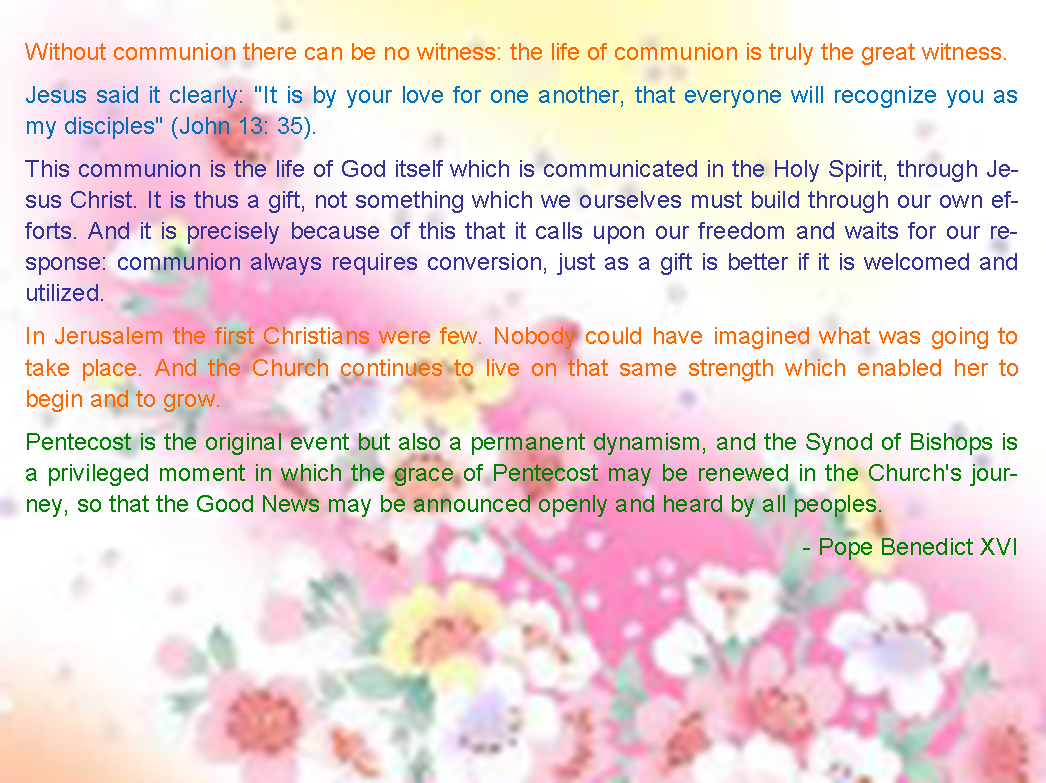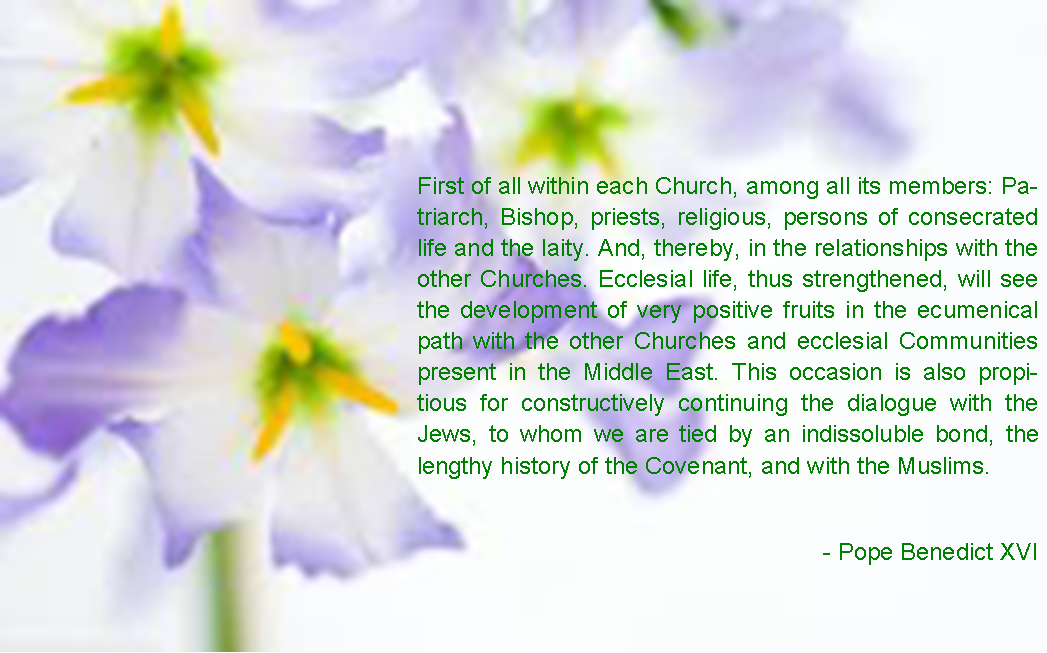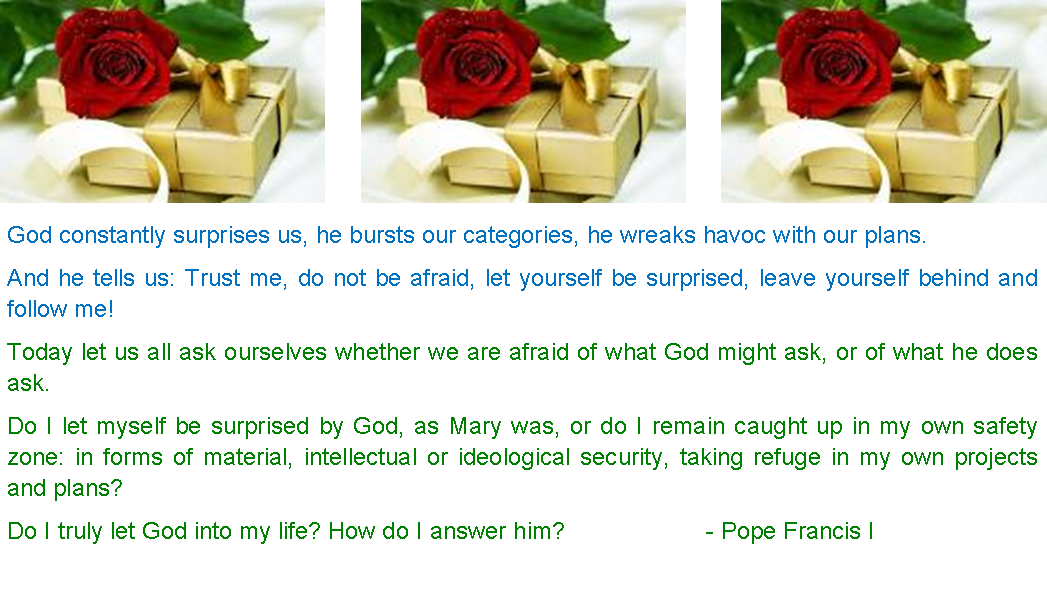|
70 |

|
PAPAL MASS FOR THE OPENING HOMILY OF HIS HOLINESS BENEDICT XVI Vatican Basilica
Venerable Brothers,
The Eucharistic celebration, the rendering of thanks to God par excellence, is marked for us today, gathered around the Tomb of St Peter, by an extraordinary reason: the grace of seeing gathered together for the first time at a Synod, around the Bishop of Rome and the Universal Shepherd, the Bishops of the Middle Eastern region. Such a singular event demonstrates the interest of the whole Church for that precious and beloved part of God's people who live in the Holy Land and the whole of the Middle East.
Above all, we give thanks to the Lord of history, because despite the often difficult and tormented events, he has permitted the Middle East to see, from the time of Jesus until today, a continuity in the presence of Christians. In those lands, the one Church of Christ is expressed in the variety of liturgical, spiritual, cultural and disciplinary traditions of the six venerable Eastern Catholic Churches sui iuris, as well as in the Latin tradition. The fraternal greeting which I address with great affection to the Patriarchs of each one of them wishes to be extended at this time to all the faithful entrusted to their pastoral care in their respective countries as well as in the Diaspora.
On this Sunday, the 28th of Ordinary Time, the Word of God offers a theme for meditation which brings us closer in a meaningful way to the event of the Synod that we open today. Continued reading of the Gospel of Luke leads us to the story of the healing of the 10 lepers, of whom only one, a Samaritan, returns to thank Jesus. Connected with this text, the first reading, from the Second Book of Kings, tells the story of the healing of Naaman, head of the Aramaean army, also a leper, who was cured by immersing himself seven times in the waters of the Jordan River, on the orders of the Prophet Elisha. Naaman too returns to the prophet and, recognizing him as the mediator of God, professes his faith in the one Lord. So two lepers, two non-Jews, who are cured because they believe in the word of God's messenger. Their bodies are healed, but they are open to faith, and this heals their souls, that is, it saves them.
The Responsorial Psalm sings of this reality: "Yahweh has made known his saving power, / revealed his saving justice for the nations to see. / Mindful of his faithful love and his constancy to the House of Israel" (Ps 98: 2-3). This then is the theme: salvation is universal, but it passes through a specific historical mediation, the mediation of the people of Israel, which goes on to become that of Jesus Christ and the Church. The door of life is open for everyone, but this is the point, it is a "door", that is, a definite and necessary passage. This is summed up in the Pauline formula we heard in the Second Letter to Timothy: "the salvation in Christ Jesus" (2 Timothy 2: 10). It is the mystery of the universality of Salvation and, at the same time of its necessary link with the historical mediation of Christ Jesus, preceded by that of the People of Israel and continued by that of the Church. God is love and wants all men to be part of His life; to carry out this plan He, who is Triune, creates in the world a mystery of a communion that is human and divine, historical and transcendent: He creates it with the method so to speak of the Covenant, tying himself to men with faithful and inexhaustible love, forming a holy people, that becomes a blessing for all the families of the earth (cf. Genesis 12: 13). Thus He reveals Himself as the God of Abraham, Isaac and Jacob (cf. Exodus 3: 6), who wants to lead his people to the "land" of freedom and peace. This "land" is not of this world; the whole of the divine plan goes beyond history, but the Lord wants to build it with men, for men and in men, beginning with the coordinates of space and time in which they live and which He Himself gave them.
With its own specificity, the land we call the "Middle East', makes up part of those coordinates. God sees this region of the world, too, from a different perspective, one might say, "from on high': it is the land of Abraham, Isaac, and Jacob; the land of the Exodus and the return from exile; the land of the Temple and of the Prophets, the land in which the Only-Begotten Son of Mary was born, lived, died, and rose from the dead; the cradle of the Church, established in order to carry Christ's Gospel to the ends of the earth. And we too, as believers, look at the Middle East with this view, from the perspective of the history of salvation. It is this internal point of view which guided me during Apostolic visits to Turkey, the Holy Land Jordan, Israel, Palestine and Cyprus, where I was able to experience first-hand the joys and concerns of the Christian communities. It was for this reason, too, that I willingly accepted the proposal of the Patriarchs and Bishops to convoke a Synodal Assembly in order to reflect together, in light of Sacred Scripture and Church traditions, on the present as well as the future of the faithful and populations of the Middle East.
Looking at that part of the world from God's perspective means recognizing it as the "cradle' of a universal design of salvation in love, a mystery of communion which becomes true in freedom and thus asks man for a response. Abraham, the prophets, and the Virgin Mary are the protagonists of this response which, however, has its completion in Jesus Christ, Son of that same land, yet descended from Heaven. From Him, from his Heart and his Spirit was born the Church, which is a pilgrim in this world, yet belongs to Him. The Church was established to be a sign and an instrument of the unique and universal saving project of God among men; She fulfils this mission simply by being herself, that is, "Communion and witness", as the theme of this Synodal Assembly which opens today says, referring to Luke's famous description of the first Christian community: "The whole group of believers was united, heart and soul" (Acts of the Apostles 4: 32). Without communion there can be no witness: the life of communion is truly the great witness. Jesus said it clearly: "It is by your love for one another, that everyone will recognize you as my disciples" (John 13: 35). This communion is the life of God itself which is communicated in the Holy Spirit, through Jesus Christ. It is thus a gift, not something which we ourselves must build through our own efforts. And it is precisely because of this that it calls upon our freedom and waits for our response: communion always requires conversion, just as a gift is better if it is welcomed and utilized. In Jerusalem the first Christians were few. Nobody could have imagined what was going to take place. And the Church continues to live on that same strength which enabled her to begin and to grow. Pentecost is the original event but also a permanent dynamism, and the Synod of Bishops is a privileged moment in which the grace of Pentecost may be renewed in the Church's journey, so that the Good News may be announced openly and heard by all peoples. |

|
Therefore, the reason for this Synodal Assembly is mainly a pastoral one. While not being able to ignore the delicate and at times dramatic social and political situation of some countries, the Pastors of the Middle Eastern Churches wish to concentrate on the aspects of their own mission. In this regard, the Instrumentum laboris, elaborated by a Pre-Synodal Council whose members we thank for their work, underlined these ecclesial finalities of the Assembly, pointing out that, under the guidance of the Holy Spirit, it wishes to revive the communion of the Catholic Church in the Middle East. First of all within each Church, among all its members: Patriarch, Bishop, priests, religious, persons of consecrated life and the laity. And, thereby, in the relationships with the other Churches. Ecclesial life, thus strengthened, will see the development of very positive fruits in the ecumenical path with the other Churches and ecclesial Communities present in the Middle East. This occasion is also propitious for constructively continuing the dialogue with the Jews, to whom we are tied by an indissoluble bond, the lengthy history of the Covenant, and with the Muslims.
Also, the work of the Synodal Assembly is oriented to the witness of Christians at a personal, family and social level. This requires the reinforcing of their Christian identity through the Word of God and the Sacraments. We all hope that the faithful feel the joy in living in the Holy Land, a land blessed by the presence and by the Paschal Mystery of the Lord Jesus Christ. Over the centuries those places attracted multitudes of pilgrims and even men and women in religious communities, who have considered it a great privilege to be able to live and bear witness in the land of Jesus. Despite the difficulties, Christians in the Holy Land are called to enliven their consciousness of being the living stones of the Church in the Middle East, at the holy Places of our salvation. However, living in a dignified manner in one's own country is above all a fundamental human right: therefore, the conditions of peace and justice, which are necessary for the harmonious development of all those living in the region, should be promoted. Therefore all are called to make their personal contribution: the international community, by supporting a stable path, loyal and constructive, towards peace; those most prevalent religions in the region, in promoting the spiritual and cultural values that unite men and women and exclude every expression of violence. Christians will continue to contribute not only with the work of social promotion, such as institutes of education and healthcare, but above all with the spirit of the evangelical Beatitudes, which enliven the practice of forgiveness and reconciliation. In this commitment, they will always have the support of the entire Church, as is solemnly attested by the presence here of the Delegates of the Episcopates of other continents. Dear friends, let us entrust the work of the Synodal Assembly for the Middle East to the many Saints of that blessed land; let us invoke upon it the constant protection of the Blessed Virgin Mary, so that the coming days of prayer, of reflection and of fraternal communion may be the harbingers of the good fruits for the present and for the future of the beloved Middle Eastern populations. To them we address a hopeful greeting with all our heart: "Peace to you, peace to your family, peace to all that is yours!" (1 Samuel 25: 6).
Acknowledgment: We thank the Vatican Publisher for allowing us to publish the Homilies of Pope Benedict XVI, so that it could be accessed by more people all over the world; as a source of God’s encouragements to all of us. |

|
HOLY MASS FOR THE MARIAN DAY HOMILY OF HOLY FATHER FRANCIS Saint Peter's Square
In the Psalm we said: “Sing to the Lord a new song, for he has done marvellous things” (Psalm 98:1).
Today we consider one of the marvellous things which the Lord has done: Mary! A lowly and weak creature like ourselves, she was chosen to be the Mother of God, the Mother of her Creator.
Considering Mary in the light of the readings we have just heard, I would like to reflect with you on three things: first, God surprises us, second, God asks us to be faithful, and third, God is our strength.
1. First: God surprises us. The story of Naaman, the commander of the army of the king of Aram, is remarkable. In order to be healed of leprosy, he turns to the prophet of God, Elisha, who does not perform magic or demand anything unusual of him, but asks him simply to trust in God and to wash in the waters of the river. Not, however, in one of the great rivers of Damascus, but in the little stream of the Jordan. Naaman is left surprised, even taken aback. What kind of God is this who asks for something so simple? He wants to turn back, but then he goes ahead, he immerses himself in the Jordan and is immediately healed (cf. 2 Kings 5:1-4). There it is: God surprises us. It is precisely in poverty, in weakness and in humility that he reveals himself and grants us his love, which saves us, heals us and gives us strength. He asks us only to obey his word and to trust in him.
This was the experience of the Virgin Mary. At the message of the angel, she does not hide her surprise. It is the astonishment of realizing that God, to become man, had chosen her, a simple maid of Nazareth. Not someone who lived in a palace amid power and riches, or one who had done extraordinary things, but simply someone who was open to God and put her trust in him, even without understanding everything: “Here I am, the servant of the Lord; let it be with me according to your word” (Luke 1:38). That was her answer. God constantly surprises us, he bursts our categories, he wreaks havoc with our plans. And he tells us: Trust me, do not be afraid, let yourself be surprised, leave yourself behind and follow me!
Today let us all ask ourselves whether we are afraid of what God might ask, or of what he does ask. Do I let myself be surprised by God, as Mary was, or do I remain caught up in my own safety zone: in forms of material, intellectual or ideological security, taking refuge in my own projects and plans? Do I truly let God into my life? How do I answer him?
Continue next page …
20 October 2013 |